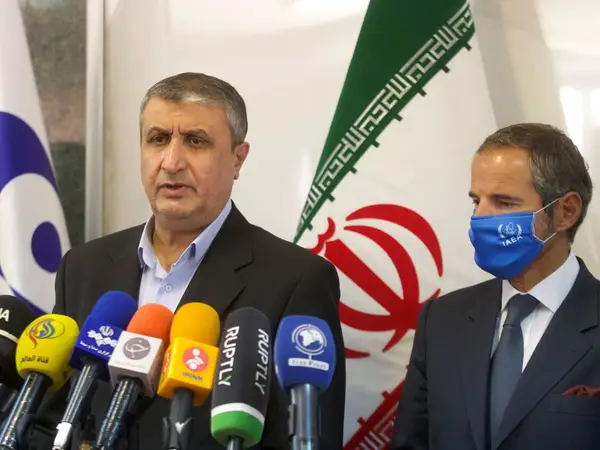The IAEA said Sunday it was discussing with Iran the results of recent verification work, after a report that it had detected uranium enriched to weapons grade.
On Sunday, Bloomberg News quoted senior diplomats as saying that the UN watchdog, the International Atomic Energy Agency (IAEA) had recently detected uranium enriched to 84 percent while monitoring Iran’s nuclear facilities.
Iran has been enriching uranium to up to 60 percent purity since April 2021. Three months ago, it started enriching to that level at a second site, Fordow, which is dug into a mountain. Weapons grade is around 90%.
"The IAEA is aware of recent media reports relating to uranium enrichment levels in Iran," the International Atomic Energy Agency said on Twitter. "The IAEA is discussing with Iran the results of recent Agency verification activities and will inform the IAEA Board of Governors as appropriate."
The IAEA, which inspects Iran's nuclear facilities, flags significant developments in Iran's activities either in ad hoc reports to the 35-nation Board of Governors or regular quarterly ones issued before board meetings.
Diplomats said on Sunday evening that the IAEA so far had not issued any such report.
The Islamic Republic has reduced IAEA’s monitoring access to its activities since early 2021 and has violated limits set by the 2015 nuclear accord (JCPOA) that kept enrichment below 5 percent. Tehran began violating the limit in 2019, when the US imposed full oil export sanctions after withdrawing from the JCPOA.
Nearly two years of diplomatic attempts to restore the deal have failed, with the West also becoming critical of Iran’s bloody crackdown on popular protests and its supply of military drones to Russia.
Any of the three European signatories of the JCPOA, the United Kingdom, France or Germany could trigger a UN Security Council mechanism enshrined in the agreement, to reinstate international sanctions on Iran for its enrichment violations.
The IAEA Board of Governors will have its next meeting on March 6 and a report on Iran will be discussed. If the new violation is presented at the meeting, Western countries may decide to take the issue to the Security Council.
Israel has repeatedly warned that it will not allow the Islamic Republic to acquire nuclear weapons. Israel's Defense Minister Yoav Gallant said February 17 that "all possible means" were on the table to prevent Iran from building a nuclear weapon. Since the breakdown of the nuclear talks, US officials have repeatedly said that President Joe Biden will not tolerate a nuclear Iran.
Bloomberg reported earlier on Sunday that the IAEA was trying to clarify how Iran enriched uranium to 84%, citing two senior diplomats.
"Inspectors need to determine whether Iran intentionally produced the material, or whether the concentration was an unintended accumulation within the network of pipes connecting the hundreds of fast-spinning centrifuges used to separate the isotopes," Bloomberg reported.
It added that the detected material could have been "mistakenly accumulated because of technical difficulties in operating the centrifuge cascades — something that has happened before", citing one of the diplomats.
The spokesman for the Atomic Energy Organization of Iran rejected Bloomberg's report as "distortion of facts" and said, "We have not enriched uranium to purity levels above 60 percent so far." He added that the IAEA has informed Tehran that "the presence of uranium particles with above 60-percent purity is common in sampling."
With reporting by Reuters
